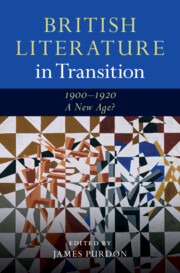Book contents
- British Literature in Transition, 1900–1920: A New Age?
- British Literature in Transition Series
- British Literature in Transition, 1900–1920: A New Age?
- Copyright page
- Contents
- Contributors
- General Editor’s Preface
- Acknowledgements
- Introduction
- Part I Nation and Empire
- Part II Media
- Part III Aesthetics
- Chapter 12 Transitions, Turns
- Chapter 13 Poetry and Transition
- Chapter 14 Realism and Mass Politics
- Chapter 15 Short Fiction
- Chapter 16 Ideals of a Picture Gallery
- Part IV Society
- Index
Chapter 15 - Short Fiction
from Part III - Aesthetics
Published online by Cambridge University Press: 07 December 2021
- British Literature in Transition, 1900–1920: A New Age?
- British Literature in Transition Series
- British Literature in Transition, 1900–1920: A New Age?
- Copyright page
- Contents
- Contributors
- General Editor’s Preface
- Acknowledgements
- Introduction
- Part I Nation and Empire
- Part II Media
- Part III Aesthetics
- Chapter 12 Transitions, Turns
- Chapter 13 Poetry and Transition
- Chapter 14 Realism and Mass Politics
- Chapter 15 Short Fiction
- Chapter 16 Ideals of a Picture Gallery
- Part IV Society
- Index
Summary
This chapter argues that the spatialising habits of the short fiction of the period can best be understood in terms not only of a modernist preoccupation with the complex and ambiguous layering of urban milieu, but of its polar opposite: the threat (or promise) of movement, of inter-relation, which unsettles the remote traditional communities portrayed in local colour writing. James Joyce’s ‘The Dead’, Katherine Mansfield’s ‘Bliss’ and ‘The Stranger’, and ‘A Conjugal Episode’, a late story by one of the most successful New Woman novelists, George Egerton (Mary Chavelita Dunne), will be taken to exemplify the first of these tendencies. The second can be shown to include stories about Englishness and empire, by Rudyard Kipling and D. H. Lawrence; stories about migration, by Joseph Conrad and George Moore; and stories about ghosts, by M. R. James and May Sinclair. In either case, short fiction tended to be at its best, and most characteristic, when least forgiving.
- Type
- Chapter
- Information
- British Literature in Transition, 1900–1920: A New Age? , pp. 279 - 294Publisher: Cambridge University PressPrint publication year: 2021

